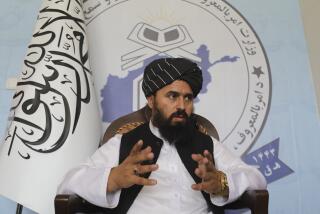A Killing Field Reverts to Life as a Stadium
- Share via
KABUL, Afghanistan — The last time Mohammed Gheyas went to watch soccer at the national stadium, the players were unable to do their pregame warmups. Instead, a Datsun pickup truck with a bound man in its cargo bed lumbered toward a basketball hoop at the eastern end of the field.
As the fans waited, Taliban militiamen fixed a noose over the goal’s highest crossbar, draped it around the man’s neck and signaled the driver to gun the engine. The truck lurched forward, leaving the condemned enemy of the Islamic state swinging and struggling until death finally stilled him.
Gheyas was too frightened to join in the hangmen’s satisfied shouts of “Allahu akbar!” (God is great).
But none of the roughly 10 executions he witnessed scared him away from the sports venue here in the Afghan capital that the Taliban made its killing field.
“There was no cinema, no television, nothing to do,” the 20-year-old mechanic’s apprentice recalled of such public displays of fanatic justice. “We came out of curiosity and boredom.”
On Wednesday, Gheyas was back, along with several hundred other men and boys, each shelling out 2,000 afghanis--less than six cents yet still a handsome sum here--to watch two local teams compete in a game celebrating the liberation of Kabul one month ago.
The favorites won handily, with Maiwand beating the less-experienced Solha 3-0.
The spectators, swathed in scarves and blankets against the marrow-chilling cold, seemed less concerned about the outcome than the newfound opportunity for entertainment.
“The Taliban made our lives a misery,” said 54-year-old Mohammed Qasem, a clerk at the idle Ministry of Education. “Once I came to see a match and instead we saw a man dragged to the center of the field, where the Taliban cut his throat and bled him like a goat in front of everyone. The match never happened.”
This week’s tournament, pitting eight Kabul teams in a round robin, will conclude after end-of-Ramadan celebrations that are expected to begin this weekend.
The games nudged this society toward normality.
But the ill-shod and unpracticed squads of young men weakened by the all-day fasts observed during the holy month of Ramadan also illustrate how far behind the outside world this country has fallen.
The entrance to the crumbling, bullet-riddled stadium, suddenly alive with cheering fans, is still emblazoned with the five interlocking rings of the Olympic movement.
Afghanistan has not entered global sports competitions since 1996, and there is too little time for it to put together a delegation for the Winter Games that will begin in two months in Salt Lake City.
Still, sportsmen and even a few sportswomen have begun rebuilding their federations, facilities and clubs out of conviction that sport is part of the mortar that will cement this country into the international mosaic.
Abdul Saboor Azizi, the national women’s basketball coach, has just returned to the post of chairman of the Afghan Olympic Committee. He said the country will be ready for the 2004 Games.
Azizi quit his post in 1996 after the first public execution at the stadium. He said the venue is meant for elevating the human spirit, not extinguishing it.
He continued to clandestinely coach the women--who haven’t played a game in public in 14 years--on rare occasions when he could find a court at a school remote enough to escape the Taliban’s notice. Coaches of other teams did the same, he said, allowing 22 sports federations to survive, if only in name and spirit.
Mohammed Wasey Naderi, 18, trained as a gymnast from early childhood but has never been in international competition because of Afghanistan’s isolation during Taliban rule, which began when he was 12.
“It’s hard to find a place to practice. All the sports halls are in ruins,” said Naderi, who nonetheless hopes to try out for the 2004 national team.
Azizi, who made his living driving a taxi during the Taliban era, hopes the new interim government that will take office Dec. 22 will embrace sports to help unify the nation and reintegrate the country with the outside world.
But after 23 years of occupation, civil wars and power struggles, many young Afghans are better acquainted with weapons than with sports. Several members of the new leadership represent parties with policies almost as repressive as the Taliban, Azizi warned, and the future of sports here remains uncertain.
The Olympics chief was on hand before Wednesday’s soccer game to accept a gift of 10 basketballs from British sports clubs.
The same sponsors also outfitted the soccer tournament teams with new uniforms sent on a British Broadcasting Corp. charter flight.
The lopsided Maiwand-Solha game elicited smiles and hearty cheers from the concentric concrete rings that serve as bleachers. But several young spectators, apparently indoctrinated with the Taliban’s anti-Western sentiments, hurled rocks at a Times photographer taking pictures from the sidelines.
Not a single Afghan woman was among the 300-odd spectators. Women have never attended sports events here, several fans explained. Most said they expect that to change.
Mohammed Fahim, however, insisted that women have no place at public entertainment events. “We threw out the Taliban,” the 45-year-old public health worker insisted. “We are not throwing out Islam.”
More to Read
Go beyond the scoreboard
Get the latest on L.A.'s teams in the daily Sports Report newsletter.
You may occasionally receive promotional content from the Los Angeles Times.









